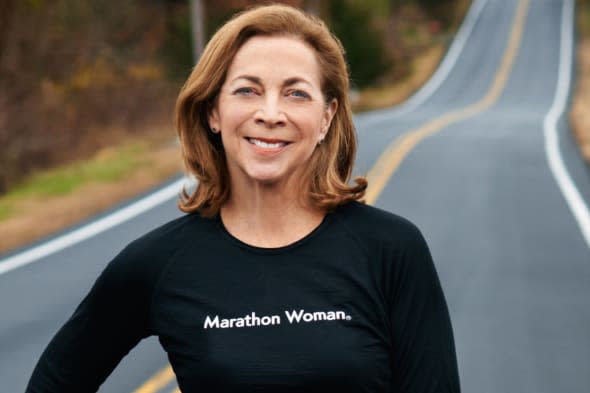Anniversary: Boston Marathon 2013
By: Kathrine Switzer, the first woman to run the Boston Marathon

There is an expression in marathon running that you go through a lifetime of experience every time you run one. It's absolutely true, because the marathon is not just something you can go out and do; you need to train for it. It takes a long time to be able to run for 26 miles, 385 yards, and that means discipline and sacrifice. Then, when you run it, it puts you face to face with yourself, your capability, your belief, your self-doubt and your fears; it takes everything you have.
But when you've finished it, you know you can do anything. You're powerful. You're fearless. You're older and a lot wiser. Especially when things happen in the race that are unpredictable-bad weather, a sore knee, an upset stomach. You cope; you forge on, because the whole purpose is to finish.
In 1967, the race director of the Boston Marathon tried to rip off my bib numbers and throw me out of the race because I was a woman in what was then a men's only race. My boyfriend knocked the official away from me, and I made the tough decision to finish the race no matter what. In the course of the race, I slowly grew up, realized the official was just a man of his time, and that it was my responsibility not only to finish to show the world women could run, should be allowed to, but also to create opportunities for them. That run changed my life as well as history, as creating those opportunities to run has empowered millions of women's lives in every respect. They know they can do anything and they deserve the opportunity to try.
Mine is just one of many stories about the Boston Marathon. Over the next 46 years that I have been at the race-- eight times as a finisher and the rest as a TV commentator at the finish line--I have witnessed the most astonishing feats of human capability, endurance and emotion. Each year I go through another lifetime, just as each participant in the drama does. What began as a small geeky activity all those years ago has become a mainstream fitness revolution that has changed the face of our major cities, as all our lives, women's especially (there are now more women runners in the USA than men --56%!)-Because it's not really just about running, it's about empowerment, freedom and fearlessness. That's for all of us, men and women, and it's a force wholly for good.
One year ago today, I was at the finish line again of the Boston Marathon doing my 36th consecutive television broadcast for WBZ-TV Boston. After wrapping a five-hour broadcast, I left the area 20 minute before the deadly bombings. Suddenly the sport I grew up with, the force wholly for good, had also become big enough to be a terrorist's dream photo op.
I was shocked, of course, but not surprised. I was at the Munich Olympics in 1972, and nothing after that will surprise me again. But I was saddened and very, very angry. There is never an excuse for taking an innocent life. There is never an excuse for terrorism. Once again we hurdled through a lifetime of emotion, and this time the whole nation and the global world of running spun with us.
Next Monday, April 21, perhaps we'll go through the most important lifetime yet-the one of getting some closure on the past and a brave, fresh look at the future. Everyone in the world who can run wants to run the 118th Boston Marathon next Monday. We all want to run for the same reason: to show that the important thing is to embrace the drama of the marathon, for all the wisdom and strength it gives us, for better or worse, to prevail, to be resilient, to show we deserve to be there and always will. Because to run makes us fearless, and a fearful world needs us.
Kathrine Switzer was in the habit of signing her college papers "K.V. Switzer" and did so when she registered for the all-male Boston Marathon in 1967. She wasn't the first woman to run the race, but her presence as an official entrant made her a visible and potent threat to the sports world's status quo. The simple gesture exploded when an official attacked Switzer on the course, grabbing for her race numbers and screaming and cursing at her before being body blocked by her boyfriend.
The incident was broadcasted worldwide and put a shocking face on the hostility to women's full participation in athletics. Time-Life listed it among its "100 Photographs that Changed the World." Her 38 subsequent marathons (she's still running them) include a win in New York in 1974. She led the successful drive to get the women's race into the Olympic Games, has won an Emmy for her TV commentary, and is the author of three books, including her memoir, Marathon Woman. Switzer's ongoing campaign to help women around the globe empower themselves through the simple act of running made her a 2011 Inductee into the National Women's Hall of Fame.
Courtesy of MAKERS.com


